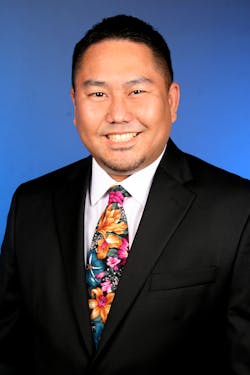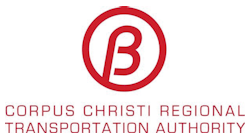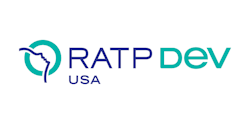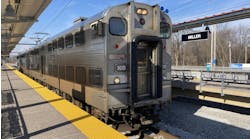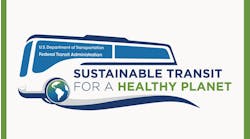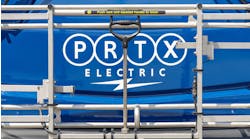Corpus Christi, Texas
Kelly Coughlin
Director of Marketing and Governmental Affairs
Corpus Christi Regional Transportation Authority
We at the Corpus Christi Regional Transportation Authority (CCRTA) have many different opportunities to help employees further their professional learning in their field. When the average person thinks of transportation all they see are the objects themselves: Buses, rail cars, tram tracks, etc. They do not see all of the hardworking and dedicated people it takes to keep the transit systems functioning efficiently.
When employees apply for higher education or leadership experience, that is taken into account by their direct supervisor when it comes time to discuss their job performance and could potentially be used for an increase in pay.
We encourage professional learning and development in various ways. One of those ways is by allowing employees to attend national conferences to stay current on an ever moving industry. These trainings bring to light issues faced by the industry as a whole as well as niche issues faced by transit professionals and the practical solutions for solving the problems.
Another way to encourage learning is that at the CCRTA we provide professional training sessions throughout the year. This year alone we will cover leadership training using the Covey Method, media training, procurement training, customer service, communication and many more to foster a positive work environment.
The CCRTA has a very active community that focuses on leadership as well as encouraging employees to apply for the many different leadership opportunities available to them in transit. We constantly have employees undergo Leadership Corpus Christi to build strong community relations and to bring transportation issues to the forefront of the community’s attentions. We also encourage employees to apply for APTA’s leadership programs to be recognized as leaders in the industry.
Finally, the CCRTA has a very benevolent tuition reimbursement program for its employees to promote employees to pursue their higher education in all departments. It is especially exciting to see employees rise in the ranks in operations and transportation to become an administrative employee and use all of their skills and expertise to influence decisions.
We will continue to use all of our skills and knowledge to drive our public to school, to work, and to complete all of their daily tasks.
As always, the CCRTA and its employees are forever driving forward.
Honolulu, Hawaii
Jon Y. Nouchi
Deputy Director, Department of Transportation Services
City and County of Honolulu
TheBus/TheHandi-Van/Honolulu Rail Transit
Outside of bus and rail rodeos and grant submittals, our transit industry is rarely competitive and largely collaborative.
This is our greatest strength.
Agency-to-agency, city-to-city, we share in our great successes and learn from each other’s occasional setbacks. The ongoing networking and relationship building that happens naturally at conferences turns simple handshakes and business card exchanges into long-lasting partnerships and knowledge sharing.
While content is always key in the conference setting, it is essential that transit agencies send forward-thinking individuals to experience the host cities they are staged in, to see what actually works on the street, and to validate new ideas ripe for implementation in their own spaces.
The city and county of Honolulu, as well as the rest of the State of Hawai‘i, is the most isolated state in the United States of America. Our county, which comprises the island of O‘ahu and includes the iconic Waikīkī district, is known for its great weather and natural beauty. It also has notable urban density, in some areas rivaling that of Manhattan in New York City. We are consistently ranked near the middle of the top ten American cities based on per-capita transit ridership on our bus-only system (rail coming soon).
However, we cannot exist solely on our island, and must seek collaboration with other municipalities and transit agencies to sharpen our best practices toolkits with the latest and greatest techniques.
We regularly send our city and transit agency employees on conference trips and siting tours. While it might be cost-prohibitive to travel across the Pacific for every learning experience, it is absolutely worth the price of travel for our team members to bring back new ideas to Hawai‘i or share lessons learned with other places.
This learning exchange through travel is surely a two-way street. Why should cities and agencies reinvent the proverbial wheel when collaboration can save everyone time and money, recognizing the value of best practices and lessons learned before proceeding down a project path?
The city and county of Honolulu has recently collaborated with the Commonwealth Office of Transit Authority of Saipan in the Northern Mariana Islands. While they are geographically closer to Asia than the United States, they are managed via the same Federal Transit Administration Region as Hawai‘i. Saipan is currently in the planning stages to bring much-needed fixed-route transit to their island. Looking at the similarities between our places, it is natural to share Honolulu’s over 100 years of public transit experience with Saipan. We plan to welcome their teams to Honolulu and travel to Saipan to conduct peer reviews. Again, this natural networking and sharing through travel presents so much value to both places.
We often ask our transit team members in planning, operations, and maintenance to think outside of the box. Travel is one way to break out of their day-to-day boxes and expose them to new people, new ideas, and new possibilities. Get out there, meet the people, eat their food, ride their transit, live their city, and tell them about ours — then cross the ocean and bring the best things they see back to our island home.
New York, N.Y.
Catherine Chardon
CEO, RATP Dev America
RATP Dev
At RATP Dev, developing our team members has always been top of mind. We take a number of paths to make this happen. Through our Grow Our Own program we first meet with, and encourage our team members to share their goals and aspirations. From there we can create individual development plans that might include online training, job shadowing, or role changes to focus on specific skills, industry association training, etc. We continue to advance our thinking in this area with the goal of providing our team members with the visibility to what the future could be, and then encourage them to take advantage of the resources available. Our objective is to help our team think through what they want to do to continue their growth, then help them align on the best way to do that.
What opportunities do we provide transit professionals for advancing their professional learning?
We encourage all of our employees, particularly our maintenance and operations teams, to take advantage of our career advancement opportunities. For example, in addition to the many hours of technical training they receive, our maintenance employees can advance through a progression of Lead-Supervisor, Superintendent, Assistant Director, and Director. During this process, they attend training to sharpen their interpersonal and managerial skills, including courses on conflict resolution and interacting with difficult individuals. Bus operators can advance through our Revenue Vehicle Movement Control (RVMC) program allowing them to learn skills in Street Supervision, Radio Control, and Dispatch. Upon completing these courses to management’s satisfaction, they can become eligible for new career opportunities.
We also listen to our employees. We are open their suggestions about programs that will keep them current in their professional areas. Beyond our maintenance and operations teams, we also support our human resource, finance, and other business-related roles to attend local and national training programs, whether it be a government-offered program or a local professional associations meeting. We support our employees’ endeavors to obtain certifications from the Transportation Safety Institute, FEMA, and others. Many of our employees participate in “peer groups” and interact with other transit agencies. We also occasionally host private, intensive off-site training opportunities to bolster our team environment and focus on advanced leadership and communication skills. These off-site training's cover topics such as ethics, decision making, and delegation. We work to develop leadership skills, identify strengths and weaknesses, review succession planning, discuss our culture as a team, and plan for the future. These elements bond our teams together and help us build a strong foundation of unity.
Los Angeles, Calif.
Patrice McElroy
Executive Officer Talent Management, the LA Metro Talent Acquisition Department
Los Angeles County Metropolitan Transportation Authority
The Los Angeles County Metropolitan Transportation Authority has more than 10,000 employees working across Los Angeles County. With our agency — and the transit industry — facing a wave of retirements, we must always be in talent development mode. We have a mandate from county voters to build 40 capital projects in the next 40 years while operating the nation’s third busiest transit system.
As part of this effort, Metro has adopted a multi-prong career pathway approach which assists in recruiting and retaining employees. The “prongs” in the career pathway that address professional learning are Employee Development, Management/Leadership Development and Transportation Executive Senior Leadership.
In the realm of Employee Development, Metro offers a series of classes designed to help employees gain professional knowledge and enhance skills to succeed in their current roles. One of these classes is the Department 101 course, which was created to help all employees understand their function and position and the impact their individual department has on the agency as a whole.
In Management/Leadership Development, employees are offered opportunities to further develop their competencies related to the business goals. One of these programs is the Multi-Agency Exchange Program (MAX), which allows Metro employees to briefly work at other transit agencies. This provides LA Metro employees the chance to see and experience different approaches to our work and seek solutions for common industry challenges.
This speaks to a larger issue. We don’t want Metro employees only learning the Metro way of doing things. We want our employees exposed to a world of ideas. That is how employees gain knowledge and become leaders. That is why we also allow employees to attend conventions and seminars where they can learn new skills we may not be able to teach — and to bring the best ideas home.
All employees benefit from learning, thus our Transportation Executive/Senior Leadership program, which is aimed at advancing senior leadership members’ understanding of industry trends and advancing strategic leadership skills. We participate in the American Public Transportation Association’s premier professional development program, Leadership APTA, which is designed to foster and support experienced managers and leaders aspiring to hold senior and executive leadership positions.
Our industry cannot just rely on developing talent that we already have. We believe that if our industry is going to rebuild the nation’s infrastructure, we must ensure people want to be part of our industry. We have focused very heavily on several programs designed to persuade people to consider transportation as a career and to help provide a pathway to jobs at our agency or with our contractors.
Once in the door, it is our obligation to continue training and nurturing our human capital, which will always be our most important asset.
Chicago, Ill.
Geisha Ester
Director of Training and Professional Development
Chicago Transit Authority
In 2015, the newly appointed president of the Chicago Transit Authority, Dorval R. Carter, Jr., assembled his management staff to introduce himself and present his vision for the organization. That vision included three key initiatives: a heightened emphasis on safety, improved customer service and enhancing workforce development.
As the director of training and professional development, I found his focus inspiring and I was enthused that the new President not only understood the value of workforce development, but also saw it as key to our company’s success.
At CTA, we take pride in being a legacy transit system with a wealth of institutional knowledge and internal talent. Moving 1.6 million customers throughout Chicago and 35 surrounding suburbs every weekday is no easy task, and it wouldn’t happen without a knowledgeable, skilled, professional workforce.
Although CTA has always provided its employees with professional development opportunities, President Carter’s renewed focus on this critical element has transformed the organization’s training culture. As an extension of his vision, CTA launched a learner engagement initiative, where, each month, employees are informed about a variety of learning opportunities available to them.
In the past few years, CTA has focused on offering a variety of professional learning opportunities. These include monthly professional development workshops focused on relevant topics that foster skill enhancement and offer practical tools for development.
Also new to CTA is the President’s Office Rotational Program, which offers high-performing employees an opportunity to work as a member of the President's team for six months, gaining exposure to the organization's executive leadership team while working to advance key organizational initiatives. We’ve also begun Transit Talks, a platform created for transit professionals to share knowledge, network and explore topics impacting the transit industry, and we are holding professional development events focused on topics important to employees, such as resume writing, professional branding and access to professional organizations that can increase employees’ resources in the transit industry.
CTA is committed to providing targeted programs that build internal talent and address future succession planning needs. CTA now partners with a local university to offer a 10-month Leadership Development Program for entry-level managers who desire to advance their careers.
CTA has also collaborated with 13 transportation properties in the northeastern U.S. and Canada to facilitate the Leadership Exchange and Development (LEAD) program. LEAD offers a strategic, cross-agency learning and leadership development experience that prepares senior managers for future opportunities as the next generation of executive leaders.
Other external learning opportunities include participation in the APTA Emerging Leaders and APTA Leadership Programs, local leadership development initiatives like the Civic Leadership Program, participation in industry conferences, and individualized courses based on employees’ professional goals.
The Chicago Transit Authority is committed to encouraging and equipping employees to advance their professional learning, as well as to challenge them to share their institutional knowledge through demonstrated contributions to the organization and the transit industry.
